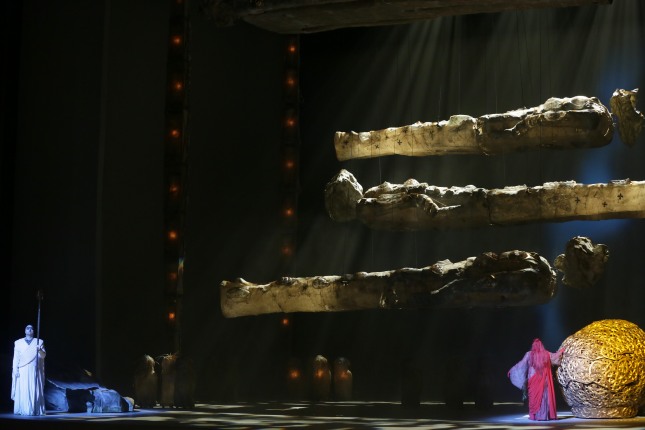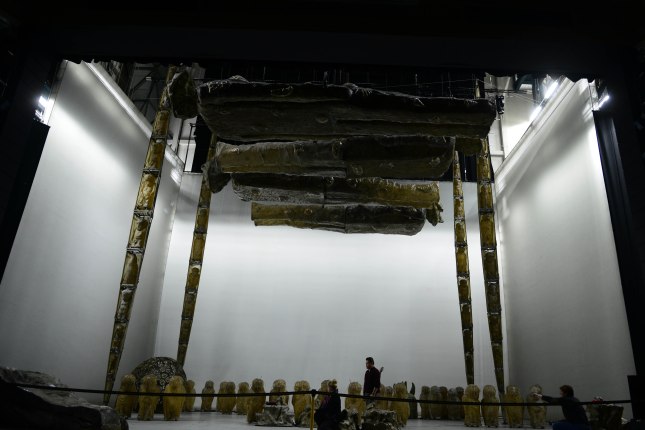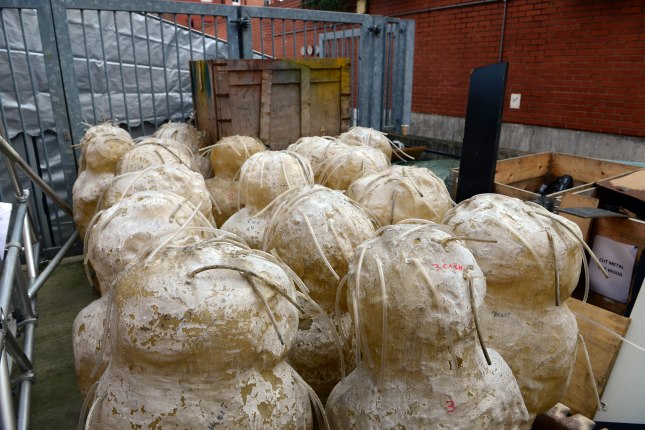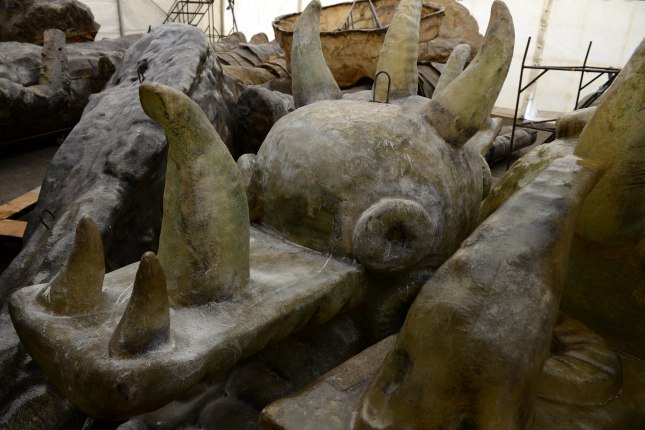 Last night, Mariinsky Opera’s take on Wagner’s epic masterpiece, Der Ring Des Nibelungen, opened at the Birmingham Hippodrome with Das Rheingold, a mythic prelude to the epic story of Siegfried, Brünnhilde and the ultimate overthrow of the Norse pantheon that occurs across the rest of the tetralogy.
Last night, Mariinsky Opera’s take on Wagner’s epic masterpiece, Der Ring Des Nibelungen, opened at the Birmingham Hippodrome with Das Rheingold, a mythic prelude to the epic story of Siegfried, Brünnhilde and the ultimate overthrow of the Norse pantheon that occurs across the rest of the tetralogy.
The Mariinsky’s Das Rheingold is a beautiful thing to behold from start to finish. The curtain lifts to reveal a group of performers draped in glowing blue cables, swaying, wave-like, around a series of strange, dwarfish statues in a mesmerising dance sequence that builds slowly along with Wagner’s stunning, ethereal prelude. Beautiful music washes over the audience as lights flicker across the stone figures, like sunlight seen underwater. Thus we are transported to the watery world of the Rhinemaidens who, to our surprise, eventually emerge from the rocks where they have been resting onstage all the while, revealed by light that slowly brightens like day dawning. Once we’ve seen them, we wonder how on earth we could have missed them: dressed in pearly gowns with striking, otherwordly hairstyles, everything about them announces them as magical beings before they ever open their mouths.
 These fantastic – in both senses – costume designs are matched elsewhere: the gods are styled in a brilliantly bold and bonkers fashion, vivid and colourful in every sense. Alexander Timchenko as Froh, for example, manages to pull off flowing, rainbow-coloured locks without losing any of his divine dignity. Wotan and Fricka are magisterially dressed in long, white, Grecian gowns, while Donner shimmers in appropriately silvery robes, a glittering, lightning-blue streak flashing through his hair. When Loge finally emerges, he is a vision in fiery red with a sharply peaked hairline. Freia’s golden dress, meanwhile, matches both golden apples of youth she tends, as well as the mound of Rhinegold she is eventually exchanged for, serving as a constant reminder of how she is valued and the shame of Wotan’s transactions with the giants.
These fantastic – in both senses – costume designs are matched elsewhere: the gods are styled in a brilliantly bold and bonkers fashion, vivid and colourful in every sense. Alexander Timchenko as Froh, for example, manages to pull off flowing, rainbow-coloured locks without losing any of his divine dignity. Wotan and Fricka are magisterially dressed in long, white, Grecian gowns, while Donner shimmers in appropriately silvery robes, a glittering, lightning-blue streak flashing through his hair. When Loge finally emerges, he is a vision in fiery red with a sharply peaked hairline. Freia’s golden dress, meanwhile, matches both golden apples of youth she tends, as well as the mound of Rhinegold she is eventually exchanged for, serving as a constant reminder of how she is valued and the shame of Wotan’s transactions with the giants.
Beyond the characters, the design of the set itself is magnificent and massive in scale: Valhalla glistens gloriously, even as huge, giant-like figures hover ominously in the air above it. The creepy statues present right from the opening are most striking of all in the Nibelungs’ mines, where their faces glow a bright, warning red.
Despite all these impressive constructions, however, the whole thing is played out against a completely plain backdrop, designed to emphasise the show’s complex lighting that in many ways does a better job of setting scenes and immersing us in the story than any flat, painted background ever could. This is one of few productions I’ve seen where it’s impossible not to be constantly aware of the lighting design, which becomes almost as important in creating mood as is the music itself. Through shifts in colour and brightness, we travel from the depths of the Rhine to the shining Valhalla, and away again to the fiery furnaces of the Niebelungs.
 The dwarfs, too, look wonderful, with fat bellies, bulked up shoulders, spindly fingers and inflated heads. For all their exaggerated, inhuman features, however, we still feel for them – especially Mime, who is played by Andrey Popov with a brilliant mix of comic timing and genuine pathos.
The dwarfs, too, look wonderful, with fat bellies, bulked up shoulders, spindly fingers and inflated heads. For all their exaggerated, inhuman features, however, we still feel for them – especially Mime, who is played by Andrey Popov with a brilliant mix of comic timing and genuine pathos.
Elsewhere, Willard White portrays a complex and commanding Wotan, and Alexander Timchenko is charming as the gentle, soft-hearted Froh. Evgeny Ulanov’s Donner is considerably more powerful and interesting than certain recent interpretations of Norse myth have led us to expect the God of Thunder to be, though the thunderstorm he conjures towards the end could perhaps have been a little more dramatic. Overall though, it’s difficult not to be taken most with the trickster fire god, Loge. Mikhail Vekua makes a deliciously mischievous and cheerfully crafty Loge, swelling with conceit in his own cleverness and guaranteed to disappoint hundreds of teenagers besotted with Marvel’s mopey, misunderstood film version of Loki.
Wagner’s music, imagination and capacity for storytelling offer perhaps the perfect route in to opera for contemporary audiences: as Neil Brand explained in his Ringside talk, it is his musical style, radically different to anything that came before, which has been largely responsible for shaping our understanding of film scoring to this day. The Prelude to Das Rheingold makes it immediately clear that this is unlike anything you might expect from an opera by almost anyone other than Wagner, and the rhythms and dramatic beats of his compositions will be immediately familiar to the modern movie-goer.
 Overall then, an exciting start to the series, which promises to be something very special. More thoughts on the story of Das Rheingold to follow, as well as a review of Die Walküre which is showing at 5pm tonight.
Overall then, an exciting start to the series, which promises to be something very special. More thoughts on the story of Das Rheingold to follow, as well as a review of Die Walküre which is showing at 5pm tonight.
For more information and to book tickets for The Ring Cycle, visit the Birmingham Hippodrome website.
Header image by N. Razina. Other images taken from the Birmingham Hippodrome blog.
